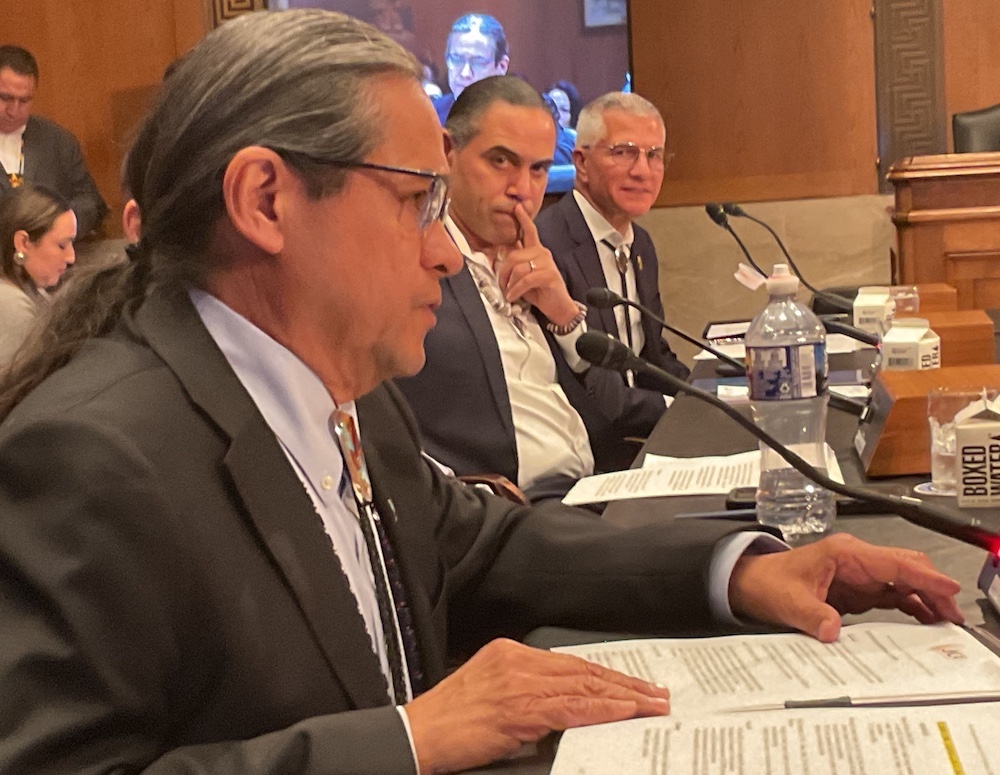
- Details
- By Chez Oxendine
- Policy and Law
Native leaders called for mandatory funding of Indian Health Service and tax parity with states during Senate testimony this week, pointing to a $9,000 gap in per-patient healthcare spending between Native and non-Native communities.
During a Feb. 12 oversight hearing, the Senate Committee on Indian Affairs heard from leaders of Native-serving organizations about Indian Country’s priorities for the 119th Congress. Speakers included:
- National Congress of American Indians (NCAI) President Mark Macarro
- National Indian Health Board Chairperson (NIHB) William Smith
- Native American Financial Officers Association (NAFOA) Board President Rodney Butler
- National Indian Education Association Board President Kerry Bird
- Council For Native Hawaiian Advancement Chief Executive Officer Kuhio Lewis
The leaders addressed priorities, including creating tax parity between states and tribes, developing renewable energy across Indian Country, and crafting a new Farm Bill that strengthens existing self-governance programs for Native food distribution. They also called for shifting discretionary spending for the Indian Health Service and the Bureau of Indian Affairs to mandatory spending to protect those budgets during future appropriations and budgeting discussings.
“The federal government's trust and treaty obligations must be upheld through concrete action to support tribal economic development and financial sovereignty,” Butler said during his testimony. “These recommendations represent an important step toward fulfilling these obligations and creating sustainable tribal economies.”
Butler highlighted parity through the Native American Tax Parity and Relief Act (S. 5048) and the Tribal Tax Investment and Reform Act (HR 8318.) The laws would create tax parity between states and tribal governments, allowing tribes to issue tax-exempt bonds, access federal funding programs typically reserved for states, and receive equal treatment regarding excise taxes.
Without tax parity, tribes are hamstrung in their ability to support municipal projects or other local capital investments, Butler said. A Brookings Institution report showed state governments issued $47 billion in municipal bonds annually from 2014 to 2020, while tribes only issued $84 million.
Tax parity would enable more projects and by extension create more revenue for tribes, boost job creation, and create spillover into nearby non-tribal communities, Butler said.
“Congress should pass this legislation to fulfill its trust and treaty obligations and support tribal economic sovereignty,” Butler said. “With strong bipartisan support from Indian Country, this legislation represents an important step toward tax fairness and tribal self-determination.”
Macarro addressed underfunding and staffing issues at the Bureau of Indian Affairs and Indian Health Service. NCAI proposes $60.05 billion for the IHS and $27.1 billion for the BIA in FY 2026.
NIHB’s Smith said current funding falls well short of demonstrated need. He pointed to IHS spending in 2023, where funding per Native patient was $4,078, compared to a national average of $13,493 spent per patient. IHS provides health care for 2.5 million American Indians and Alaska Natives (AI/ANs) as part of the federal government’s trust and treaty obligations.
“Year after year, the federal government has failed AI/ANs by drastically underfunding the IHS far below the demonstrated need,” Smith said. “This correlates directly with the unacceptable higher rates of premature deaths and chronic illnesses suffered throughout Indian communities. This is despite years of statements to this effect.”
Macarro underlined a need for both agencies to be moved to mandatory spending and for that budget to be “held harmless” when considering funding reductions going forward.
“While spending cuts or other budget control measures, such as discretionary spending caps, may severely affect tribal programs, they would have minimal impact on total federal spending,” Macarro said in his testimony. “It is crucial that the DOI-Indian Affairs, IHS, and other programs benefiting tribal nations be protected from cuts.”
